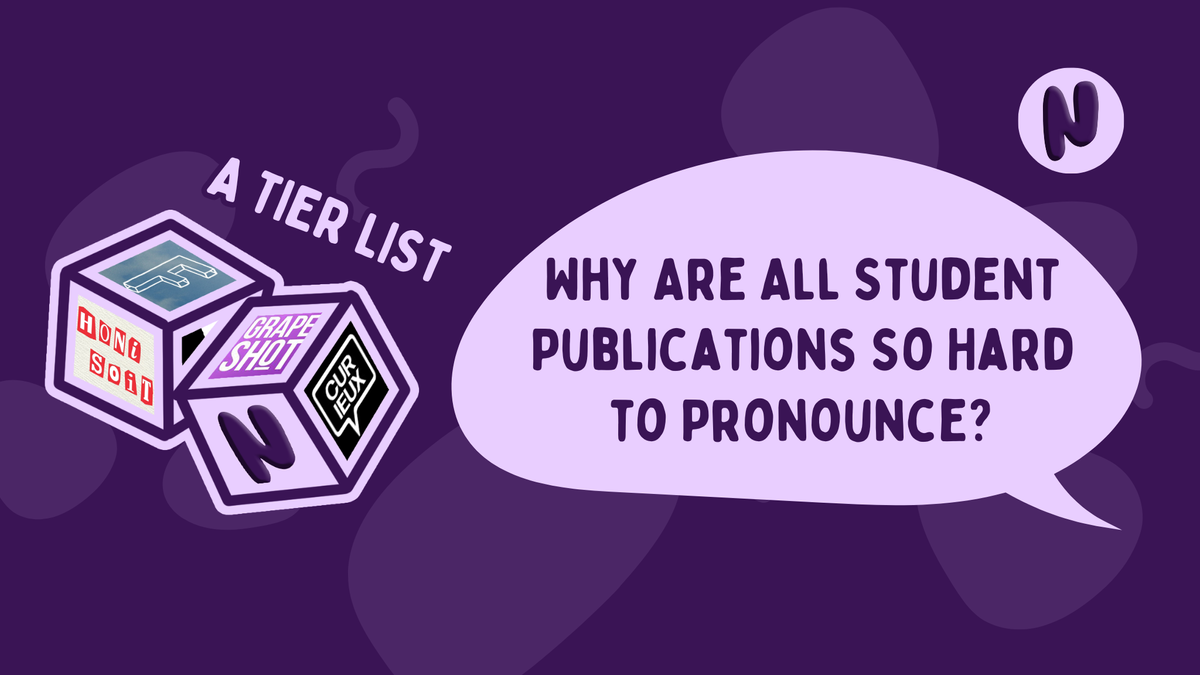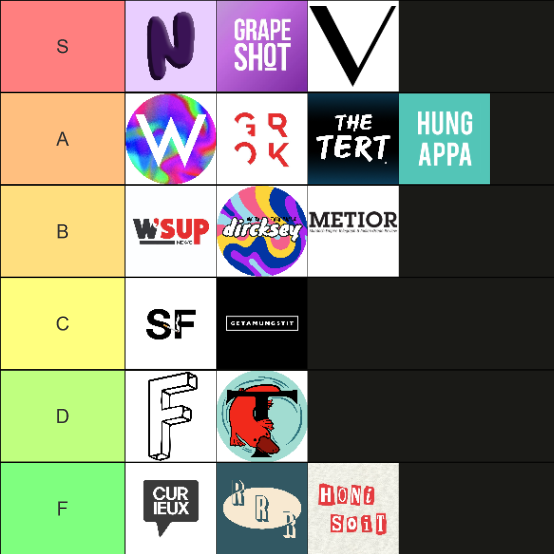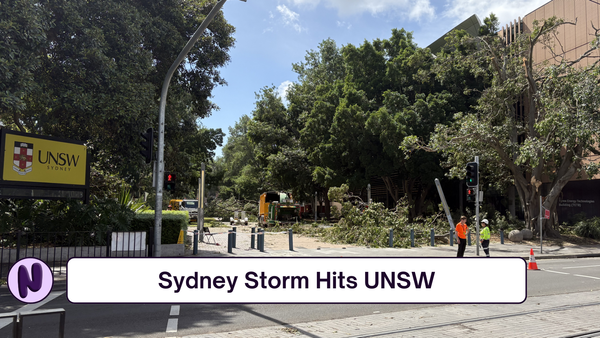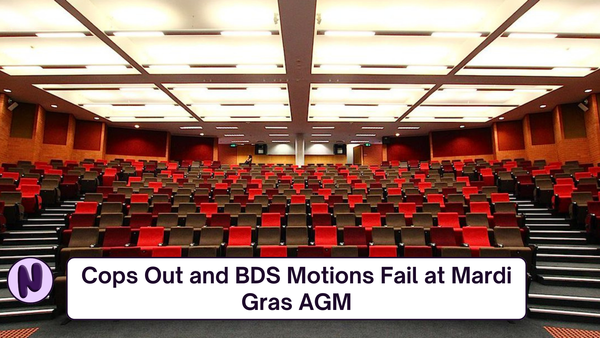Why Are All Student Publications So Hard to Pronounce? (A Tier List)
A short tierlist exploring the pronunciation of student publications in Australia.

What is it with university’s student-run publications being so damn hard to pronounce? In the past month alone I’ve ended up in full-blown arguments with friends about the correct pronunciation despite neither of us going to the publishing university. I’ve heard three different pronunciations of the same publication all happening routinely, and at this point, I’ve resorted to just mumbling something slightly resembling what I think the right pronunciation is under my breath to avoid further embarrassment.
I think it’s time this gets settled once and for all. I present to you: Noise’s official ‘Which University Newspapers are the Hardest to Pronounce?’ Tier List.
S-Tier
Publications that fall into S-tier are real words that have unambiguous pronunciations.
To begin with, UTS’ Vertigo is by and large inoffensive and actually a known word, well done. The other universities should take notes.
Next, we have Macquarie University's Grapeshot. It is technically a word and a funky one at that. Upon further research, it historically means a type of ammunition and I personally think that’s a bit silly goofy. It is easy to say so S-TIER. Slayshot!
Obviously, we cannot move on without mentioning the easiest publication to pronounce of all time (in our completely unbiased opinion of course), it’s Noise at UNSW. Congrats to us!
A-tier
A-tier candidates may not have recognisable words but are at least easy to guess and fun to pronounce.
Starting with ANU’s Woroni, meaning ‘mouthpiece’ in the Wadi-Wadi language. It’s easy, it’s boring, moving on.
We then have Curtin University’s Grok. I just really like this word; it’s super fun to say and easy to pronounce. No notes, It’s perfect. A safe A-tier.
University of Wollongong’s publication Tertangala has a lot to answer for. Not only is it a completely fabricated Aboriginal word supposedly meaning ‘smoke signals’ but its nickname, ‘The Tert’, leaves a lot to be desired. Despite this, it’s easy to say and the nickname makes it even easier. Since it's the popular choice to refer to the publication as ‘The Tert’, it secures an A-tier spot. Moving on.
Charles Sturt Wagga Wagga Campus’s newspaper is called Hungappa meaning ‘to spread the word’ in the local Wiradjuri language. Nice word, good meaning, easy to say, 10/10.
B-tier
B-tier candidates may be confusing at first but show themselves to be easy with a bit of time and practice.
WSU’s W’SUP is (ws)up first. I get it. It’s good. That being said, it confused me the first, second, and third times I saw it. Firmly in B-tier, it goes.
Next, we have Edith Cowan University with Dircksey. While it’s technically not too hard, I definitely read it wrong the first time *cough* DICKsey *cough.* Upon further investigation it is apparently Edith Cowan’s middle name and I’m so sorry for the potential offence caused.
C-tier
C-tier dwellers have a pretentious aura with extenuating factors in correctly assuming their pronunciation.
The University of Queensland brings a type of pretension to their publication name we are yet to explore, with their Latin name Semper Floreat meaning ‘May it Always Flourish.’ The whole Latin thing is overdone; go back to pulling fake Aboriginal names out of your ass like the rest of us. Also, Floreat is hard to pronounce and for that reason, the tribe has spoken. Next.
Griffith University’s Gold Coast campus publication Getamungstit is really quite something in the naming department. Maybe I’m a bit stupid, but it took me until halfway through writing this very article to understand that they were going for ‘Get Amongst It’ and hadn’t just chosen some random German word to name the paper after. Also the ‘tit’ mention earns them a point but the ‘amung (us)’ mention loses a point so do with that what you will.
D-tier (for Deceptive)
Starting this category is Melbourne Uni’s Farrago. This one is deceptively simple as while the pronunciation may seem obvious to some, I recently witnessed a conversation in which three different pronunciations of the name were happening in one conversation and it was mind-bending. Safe to say it’s a bit of a trap. Best to avoid.
University of Tasmania’s Togatus also makes this category as it has similarly deceptive vibes to Farrago. I can think of five different ways to say it while looking at it now.
F-tier (French Tier)
While this tier may have difficult pronunciation it also takes inspiration from the French language which really drops them down in the rankings.
Australian University of Canberra’s Curieux is up first. The pronunciation isn't even so bad if you’re slightly familiar with French (which to be fair, no one is). It's just that it’s French and therefore gets the rating “ew” from me.
La Trobe University also has the French name Rabelais after the 16th-century French writer. No idea how to pronounce this either. Also French. Also “ew”.
Ending with what I think is the most offensive of the bunch, University of Sydney’s Honi Soit. My best friend and I got into a heated argument about the pronunciation of this publication last week, and neither of us even go to USyd. She thinks it's ‘Honey-Swah’ and I am of the right mind that it's ‘Hoe-Knee Swah’ (this is still not a pronunciation guide, Honi editors please confirm I need to win this fight). -10000/10, nearly destroyed a decade-long friendship.
The Final Tier List

Honourable Mentions
Finally, I’d like to acknowledge some honourable mentions that didn’t make the cut due to the eligibility requirements at the start of the article. These candidates are not to do with pronunciation, I just think they have great names. Firstly we have Edith Cowan University’s discontinued publication G-Spot. I’d also like to shout out Monash Uni’s old publication Naked Wasp; a personal favourite name of mine. It still doesn’t beat Noise though.




